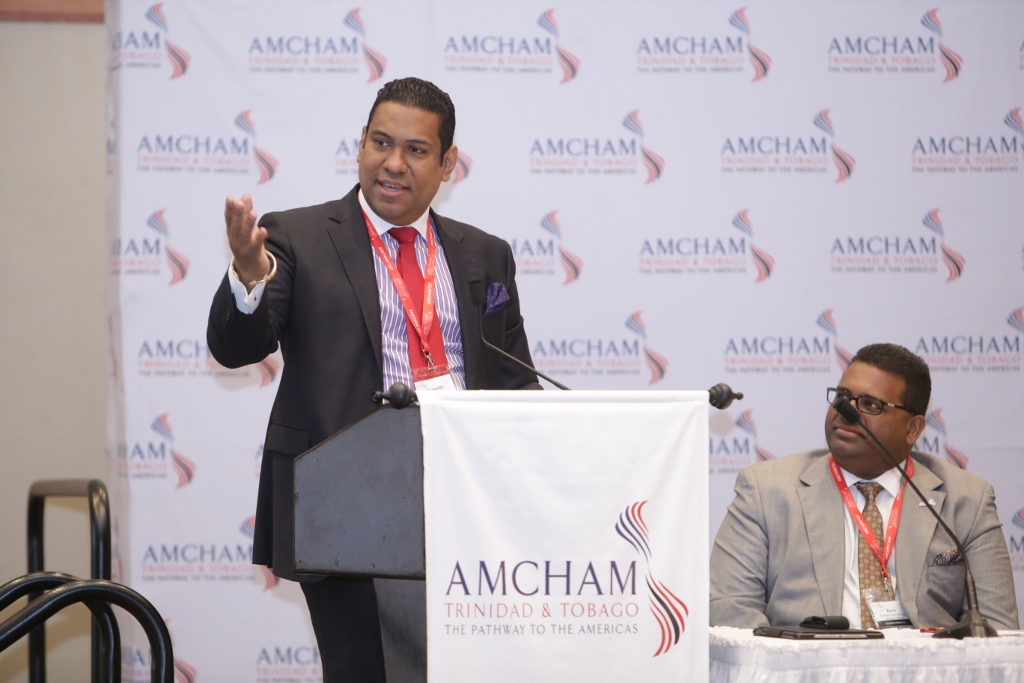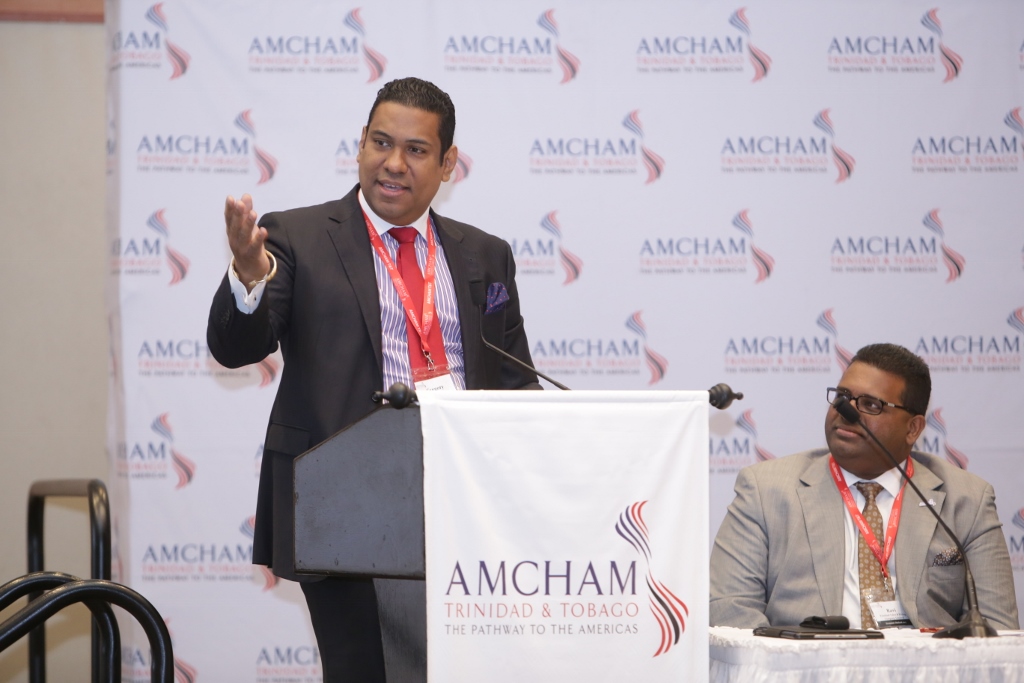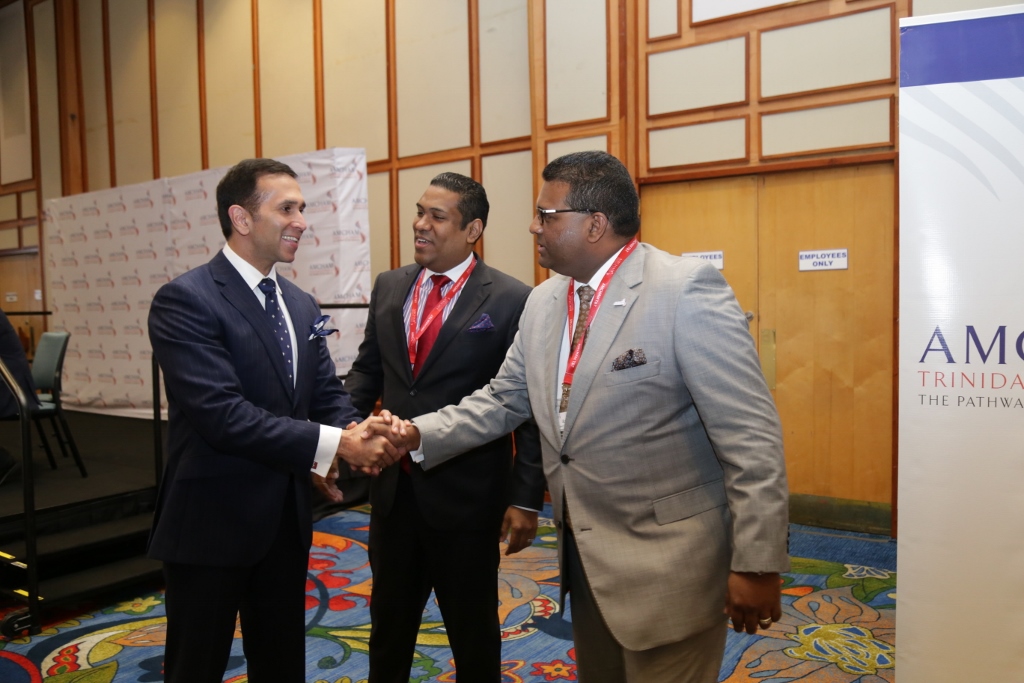

Speech by:
Gregory N. Hill – Managing Director of ANSA Merchant Bank Limited
ANSA Merchant Bank is a subsidiary of the ANSA McAL Group of Companies
Date: Thursday 19th January, 2017
Event: AMCHAM’s Economic Outlook 2017
Speech Title: Investing in times of uncertainty
Venue: Hilton Trinidad and Conference Centre
The Honourable Attorney General of Trinidad and Tobago, Faris Al Rawi, President of the American Chamber of Commerce of Trinidad and Tobago (AMCHAM), Fellow Speakers, AMCHAM Members, specially invited guests, distinguished Ladies and Gentlemen, Good Morning!
It is indeed my pleasure to have the opportunity to address this esteemed audience this morning. My intention today is to share, just a few thoughts on how we can grow our businesses together, during an uncertain, economic environment, such as we are experiencing locally.
We are all inundated with the latest economic news about our country Trinidad and Tobago, and these days, the news seldom seems to be good. Corporations and even individual investors, seem to have retreated from the market, sitting on idle capital, quite afraid to take any risks, almost frozen by the daily del-uge of negative headlines.
While some may say that our future appears bleak, history has taught us that these current economic conditions, present the best time to forge ahead with new and bold business ventures! The cyclical downturn we now face in commodity prices should not scare us from investing for the future.
Luckily, history provides us with abundant examples of how companies and countries, which have been in a similar position before, have managed to grow in a recessionary environment.
I wish to posit four (4) key ways that successful global companies use a recession to their advantage:
1. They buy assets in a discounted or what I call “fire-sale” environment. This is especially true for conglomerates and those in capital intensive industries, such as heavy manufacturing and Oil & Gas. Research and studies show that S&P 500 Companies, which rank in the top quartile with regard to return on invested capital, have a strong tendency to invest during economic downturns, when general business prospects seem low, and investor outlook is pessimistic.
By contrast, companies in the lower quartile, tend to invest during the boom periods of economic cycles, when they are apt to overpay and therefore suffer from lower returns. A recent study by the Boston Consultancy Group (BCG) noted that over the past 100 years, the companies with the highest rate of share price appreciation in the S&P 500, tend to favor acquiring competitors during downturns, versus boom times, by almost a 2 to 1 ratio.
2. They implement long delayed strategic moves with urgency. Toyota’s lean manufacturing model is a good example. The company knew since the 60’s and 70’s that it needed to introduce new manufacturing practices at its plants, but intentionally and strategically waited for economic downturns to institute those practices, when lower demand and activity levels in the factories permitted the new processes with minimal upheaval.
Also, Companies in the service sector, also tend to redesign pricing models and invest in back-office reform, such as completely new IT systems, in anticipation of renewed demand, once economic conditions improve.
The best companies always have clear, well designed plans to increase capital expenditure during slowdowns for their future business potential. These companies tend to wait, patiently and deliberately, for pullbacks in economic activity to recalibrate even their most fundamental operating models.
3. They use the recession as an opportune time for pushing through reforms and adjustments.
Large banks for example, created a risk-centric, instead of a profit-centric culture, post the 2008 financial crisis! While in the ‘80s, companies in the commodities sector significantly adjusted their labor contracts.
Exxon, for example, initiated global contract labor negotiations during the 80s, reducing costs while simultaneously increasing the viability of what were previously uneconomical prospects. The company went so far as to relocate its headquarters from NYC to, what was then, the relatively rural backwater of Irving, Texas, thereby saving $60 million a year in rent, even though the vast majority of its NY employees initially resisted the move.
The airline sector also went through similar wage negotiations during the 90s and early 2000s. This was at a time when the airline industry was in a major downturn, despite increasing consumer demand and passenger traffic, a situation analogous to the current oil and gas market.
4. They look outwards – in addition to – looking inwards. They rethink their business and target new areas, markets and commercial models.
Companies such as Samsung and Amazon are great examples, where reinvention of the core business, has become the core business of these companies!
Back in 2005, 70% of Amazon’s sales came from paperback books, DVDs, CDs and PCs, products which are either already extinct nowadays, or slowly becoming so. Fast forward to today, and what was once the biggest threat to Amazon’s business model – new media i.e. the Internet – is its biggest strength. In 2007, Amazon entered the hardware side of the business for the first time and launched the Kindle for $400, dominating the e-reader market, and supplementing the falling demand in paperbacks. At present, companies such as Netflix rely solely on Amazon Web Services (its cloud hosting service) for all their content storage needs.
A company founded on the premise of selling paper-back books is now competing with the most advanced technology firms, in one of the most competitive technological areas: cloud computing.
But, while these are all good examples of how illustrious companies have managed to grow and thrive during economic turbulence, you may ask, how does this relate directly to us in Trinidad and Tobago?
What lessons can we derive from these historical case-studies of Fortune 100 companies, and how can we implement those learnings? To answer those questions, let’s consider our environment – Is Trinidad and Tobago a good place to invest in, to begin with?
Here are my thoughts:
1. Post the 2008-2009 CLICO and HCU debacles, the governance and regulatory environment in the country has improved markedly. While specific gaps still linger, T&T is home to some of the largest and best in class private sector companies, in terms of governance, in the region. These companies have strong boards of directors, diligent management and active shareholders. The regulatory environment in the country has also improved significantly, with the introduction of the Financial Institutions Act 2008, for example, while the regulatory supervision framework has also been enhanced.
2. According to the UNDP, T&T’s citizens have one of the highest mean years of schooling levels in the entire Western Hemisphere. Thanks in part to a publicly funded tertiary education system, we possess a highly educated workforce. Further, according to the World Bank, the country also possesses one of the highest internet user-bases in the Western Hemisphere, on a per capita basis.
3. T&T has a stable political environment, reasonably high foreign exchange reserves and the banking sector retains very strong capital buffers.
The country also offers one of the most attractive corporate and individual tax regimes in the emerging world, making it an ideal destination for capital allocation.
These are the most pertinent fundamental factors that any investor should consider before making a decision to invest in a country or a region.
While we have our challenges, we operate in an open and free society, where daily discourse and an exchange of ideas have the capacity to power the innovations of tomorrow. The fundamental features of our economy remain vibrant, and will remain vibrant, regardless of the price of oil. While commodity prices tend to be cyclical, the core strength of the economy gives me confidence in the future!
Hence, returning to the topic of how we, as businesses, can thrive in this transitory economic period, I’d like to return to the four points I made earlier, and offer ideas for the business community going forward:
1. Business leaders need to be willing to step in to purchase assets that are available at discounted or what I call “fire sale” prices. Despite the current pessimistic environment, structural changes in the economy are indeed underfoot (thanks in part to the AMCHAM), and savvy businesses that recognize the reality of the economic cycles, could reap handsome rewards in the not-so-distant future. But in order to do that, we need to be less risk-averse, as a society.
2. As fiduciaries for our shareholders, we have a duty to timely retool our companies to prepare them for the future. The present slowdown gives us the perfect opportunity to buy that piece of equipment that we ought to have bought a couple years ago, but didn’t, because production could barely keep up with demand. Think about the ways that you can re-engineer your business today, to prepare for better times tomorrow!!
3. We all have to share in the economic burden that comes with living in a free society. Given the reality of the current situation, implementing reforms at our individual companies can have an additive effect to the nation, as a whole. We should not wait for the government and state-owned enterprises to lead the way.
4. Most importantly, and as per AMCHAM’s charter, we ought to look outwards, to our neighbors, for new markets and ideas to grow our businesses. Local firms have a lot of spare capital that is currently idle, because investors are uncertain about the future.
Meanwhile, firms in other parts of the world have a high demand for their products and are growing at phenomenal rates, but are clamped by the lack of available capital in order to expand.
Capital, in many ways, is analogous to water and should flow from areas of high concentration to low concentration, where more can benefit from its abundance. We have to consider partnerships, joint-ventures and M&A activity to grow inorganically, where we cannot grow organically.
In conclusion, I would like to point out that these suggestions are not just theoretical in nature, or solely the domain of sophisticated institutions in the developed world.
The ANSA McAl Group, for example, has been putting these ideas to use for the past 100 years, which remains one of the reasons that the group has been able to grow dynamically through all economic cycles.
There are also signs that the wider public and private sectors in the country have also started moving down this path. The current administration’s negotiations with Venezuela are a sure sign that major future regional partnerships are around the corner.
Furthermore, the private sector also seems to be reinvigorated with the prospects in Cuba and Guyana, with many local corporations looking at ways to expand into these two territories.
In short, ladies and gentlemen, these are exciting times.
Lastly, I would once again like to express my sincere appreciation to the Chamber for hosting this critical event, as well as, thank you for your time and kind attention this morning.
End.
















